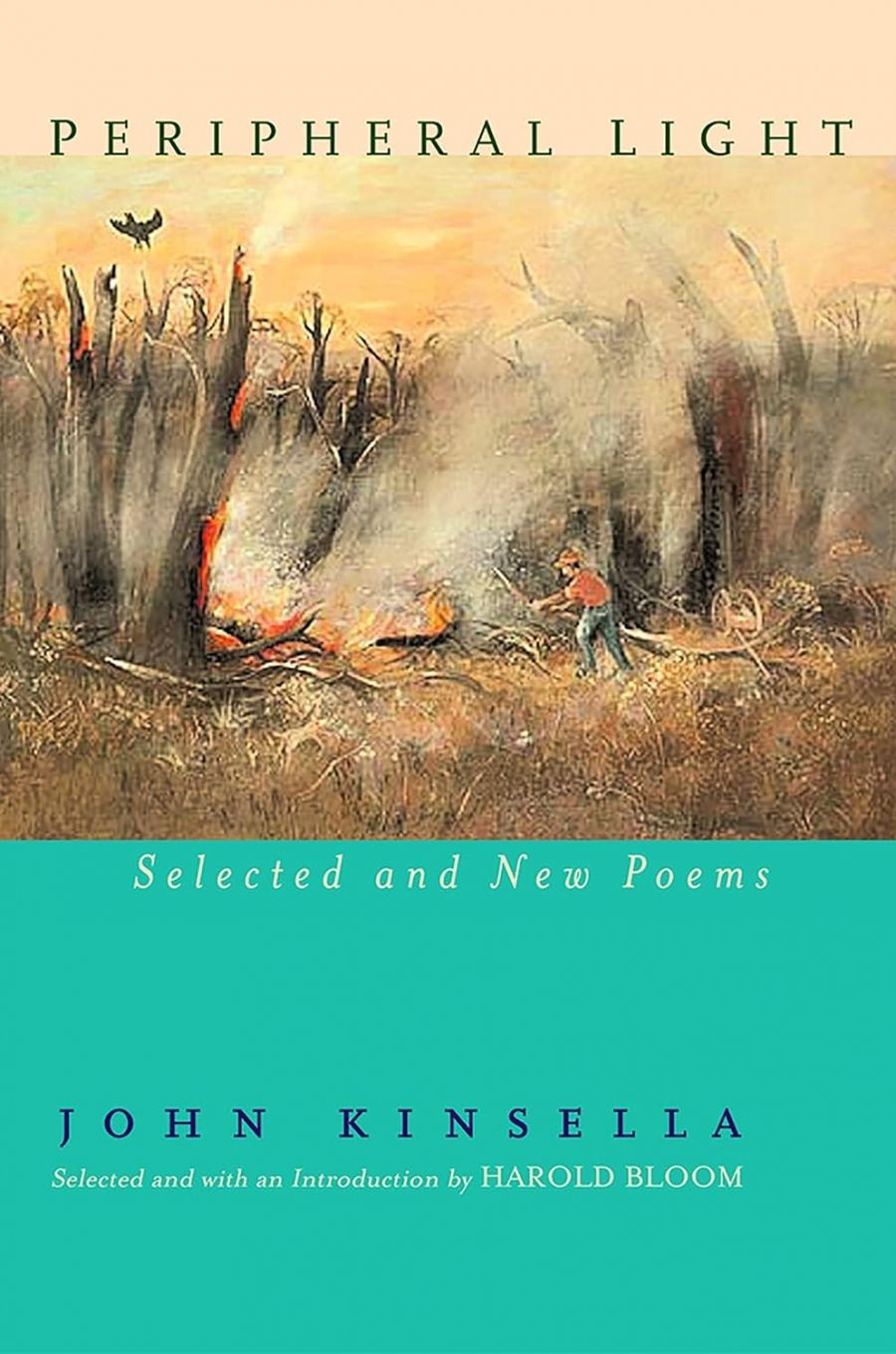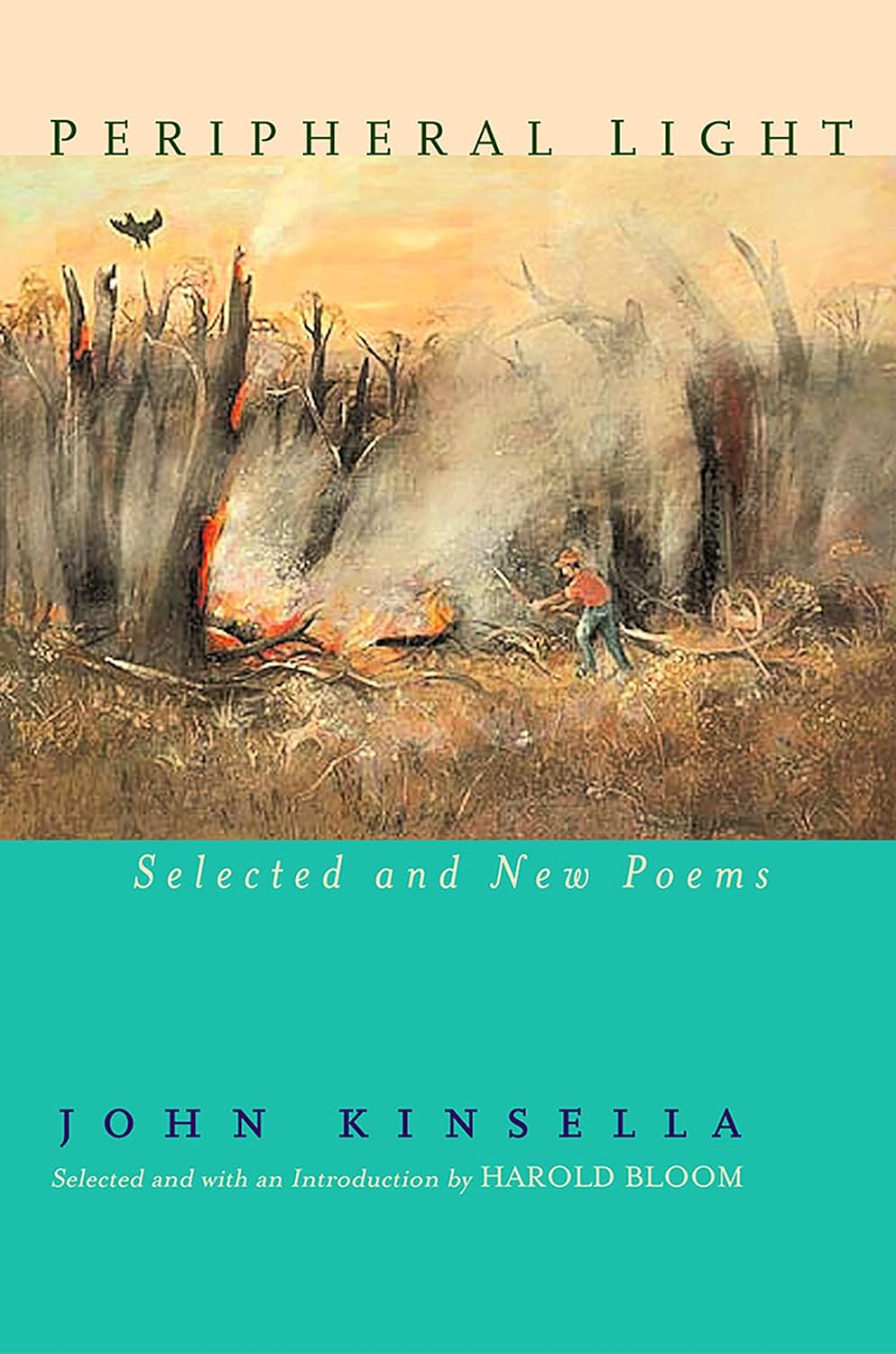
- Free Article: No
- Contents Category: Poetry
- Custom Article Title: Fidelities of Summer
- Review Article: Yes
- Article Title: Fidelities of Summer
- Online Only: No
- Custom Highlight Text:
Born in Perth, I came as a boy to think of myself as a Yorkist: my summer holidays were often spent in that glittering town, and the first sound I can remember is the intransigent call of crows over the road there from the city. For entirely good reasons, the place is almost a myth to me.
In deeper and more complex ways, that territory is mythic to John Kinsella. His Peripheral Light would look very different, and much the poorer, if it were possible to subtract the mythic dimension from this book. Reading his ‘Wheatbelt Gothic or Discovering a Wyeth’, I am reminded of an essay of Guy Davenport’s in The Geography of the Imagination, in which he details how indebted Grant Wood’s ‘American Gothic’ is to mythological motifs, and how thoroughly Wood has subsumed them. Kinsella, at his best, seems to me equally adept at living with imaginative indebtedness and at parlaying it into an asset.
- Book 1 Title: Peripheral Light
- Book 1 Subtitle: Selected and New Poems
- Book 1 Biblio: FACP, $24.95 pb, 224 pp
- Book 1 Cover Small (400 x 600):

- Book 1 Cover (800 x 1200):

No mythic system amounts to much without what David Jones calls ‘anathemata’ – things variously blessed or cursed, singled out and ‘made over’. Kinsella has taken salt to be one of these, as indeed Homer did, and whoever wrote Genesis. In ‘Finches’, he writes, ‘To join the finch / in his tenuous kingdom / amongst tamarisks, / the hot snow of salt’; and later, ‘The dead finch lies on salt, / tight-winged and stretched. //The others shimmer / loosely in heat // the salt’s white mystery / coveting tin cans, skull of sheep. // Slowly, death rides this hot glacier / further and further away.’ I take it that ‘the hot snow of salt’ and ‘this hot glacier’ are less pieces of ingenuity than portals to a specific imaginative realm where, in the famous phrase, ‘they do things differently’.
Merely to do things differently can be unsatisfactory and unpersuasive, as even the man from the original River Avon must have realised from time to time; and there are moments in Peripheral Light where Kinsella seems to be making a welter of it. But these are much the exception. It is true that, as Howard Nemerov used to point out, a fine poem is ‘not so much a thought as it is a mind … you have to talk with it awhile before it will say what it’s about’, and true that Kinsella’s poetry is often like that. The challenge lies less in esoteric language or arcane reference than in the voice’s inflection – often hardest to identify in a poet, and hardest to forget.
If I were allowed only a few items for a Kinsella sampler, one would be these lines from ‘Two Days Before Harvest’: ‘In the soon-to-be-lopped heads of wheat / there burns the fidelity of summer – beyond, / on the white-bake of salt, lines of supply / are thinning and the dust of scuffed patches / drinks the blood of eucalypts.’ Here, the naturalistic and the anthropomorphic are intertwined – myth’s way, always. The heads of wheat, the baked salt, the dusty patches and the eucalypts are ‘of the earth, earthy’: summer’s fidelity, the lines of supply, and the baroque blood-drinking are matters on which no paw or claw can be laid, and are construal, pure but not simple. At the same time, while Kinsella is no enemy of the grave or the ceremonial, he reserves the right to determine their authority, as he does in the lines that conclude the stanza: ‘Topknot pigeons / encounter themselves, much to their surprise, / in foray from sheoak to powerline and back again.’ Kinsella, for all the prominence of will and design in his poetry, often seems ready to give the world a last word.
Elsewhere in the sampler, you would find ‘The Orchardist’, which goes in its entirety, ‘Orange trees cling / to the tin walls / of his home. A red / checked shirt and grey / pair of trousers hang / over the one-eyed tractor. / His oranges are small suns / and he is an astronaut / floating slowly / through their spheres / of influence.’ Ricardo Quintana said that Swift’s word to us is always, ‘It is not as you think: look!’, and this, more benignly than Swift usually managed, is Kinsella’s word too: his is a revisionary way. The poem, artfully casual, has ‘cling’ half-chiming with ‘hang’, with the colour-coding flagging estimation, and the fruit, the one eye and the suns working together emblematically. And as often happens with Kinsella, he reanimates a concept otherwise grown pallid; ‘spheres of influence’ retrieves the ancient notion that the stars and the planetary bodies ‘in-flow’ to us – hence both ‘influenza’ and our very fates. As with the salt, the oranges are seen as what of course they are: focal points of the powers of the universe. I read of a physicist saying that every atom in our bodies was once part of some star: that, in its mingling of the intimate and the barely imaginable, sounds like Kinsella country.
In ‘Sculpting a Poem from the Landscape’s Painting’, he says that ‘Poetry will not tolerate / a mix of concept and the visual’, but unless ‘mix’ translates as ‘muddle’, he cannot believe this, since just such a blend is his métier – a phase, once again, of the mythic. It is on show strikingly in ‘Boustrophedon’, whose title recalls writing or inscription turned back upon itself as ploughing oxen turn for a new move at furrow’s end. Kinsella is not the first poet to be intrigued by this analogy, which intimates the origins of culture, and of cult, in cultivation. I am not sure how successfully the poem is brought off: it does have a ‘fine excess’, but I suspect that restlessness has got the upper hand, the oxen bolting after all. But there is no denying the intellectual energy or the imaginative aspiration. At the poem’s end, ‘These field-lines cannot grow, / cannot support search patterns and prayers; / dark rites are just fear, and so complete /the sheen, more imagined. Small plots feed // the corporate, sharp cold southerlies / remembered as a growing season steps up a gear, / body clock sounding off, speaking loud /and quiet and over-confidently in the paddocks.’
I have no idea whether Kinsella knows the poetry of the American Ben Belitt, who died as an old man in August this year. Belitt’s work is an acquired, and a minority, taste, but it happens to be much to my liking. Commentary on his poetry has sooner or later to reckon with its combination of the opulent, the armoured and the violent – with its drastic character. Kinsella’s work strikes me as being, frequently, similarly drastic. The quantum of relish, of tenderness and of celebration is high in these poems; but the country of his mind is one in which upheaval and emergency are not rare, and if they do not predominate they are never disposed to abate their claim. Of course, this being Australia, it would be a very selective view of (for instance) the natural world that did not take serious account of those phenomena: the choice of Arthur Boyd’s ‘Burning Off’ as a cover-adornment is appropriate indeed, given what can become of the country either without, or as a result of, such handling. Kinsella writes like somebody who has been warned, again and again.
At the end of ‘Chainsaw’, Kinsella writes of its being ‘Hubristic / to the final cut, last drop of fuel’. It is a coup de théâtre, warranted by what has preceded it, but a new move of its own. Kinsella’s poems are rich in this kind of thing, usually for the better. A more decorous animal than he will ever be, I admire this book’s aspiration, its flair and its hankering for ultimacies in the midst of the given. Two mythic images come upon me again and again when I read Kinsella. One of them is that of the Green Man, carved so often in European churches but exfoliating beyond their reach. The other is the array of paintings by Arcimboldo, whose ensembles of fruits both constitute human faces and signal their fragility. Kinsella’s poems have it both ways – as a poet should, if he can.


Comments powered by CComment